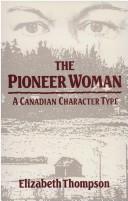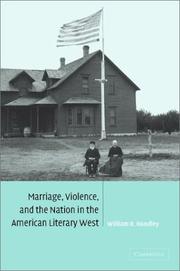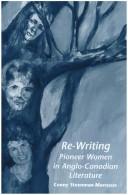| Listing 1 - 3 of 3 |
Sort by
|

ISBN: 1282855565 9786612855566 0773562885 9780773562882 0773508325 9780773508323 Year: 1991 Publisher: Montreal Buffalo McGill-Queen's University Press
Abstract | Keywords | Export | Availability | Bookmark
 Loading...
Loading...Choose an application
- Reference Manager
- EndNote
- RefWorks (Direct export to RefWorks)
Elizabeth Thompson develops the idea of the pioneer woman as an archetypal character firmly entrenched in Canadian fiction and the Canadian consciousness. Thompson's broad definition of the concept of pioneer can be seen to reflect the history of Canadian women, starting with the pioneers of settlement and continuing through the pioneers of spiritual perfection and psychological liberation. Various versions of the pioneer woman have appeared in English-Canadian fiction since Traill's development of the character type. Sara Jeannette Duncan's The Imperialist and Ralph Connor's The Man From Glengarry and Glengarry School Days feature pioneer women who cope not only with physical frontiers but also with those grounded in social and personal concerns. More recently, Margaret Laurence used this character type in The Stone Angel, A Jest of God, and The Diviners, with characters who inhabit internal, personal frontiers. Thompson argues that the longevity of this character type in English-Canadian fiction reveals an affinity between the pioneer woman and a common conception of the role of women in Canadian society. She suggests that the role for women proposed by the early immigrants was an appropriate choice for the Canadian frontier, regardless of the location and nature of that frontier.

ISBN: 110713451X 128016140X 0511120818 1139148370 0511061021 0511054696 0511308299 0511485522 0511069480 9780511061028 9780511069482 9780511120817 9780521816670 052181667X 9786610161409 6610161402 9781139148375 9780511054693 9780511308291 9780511485527 9780521093422 0521093422 Year: 2002 Publisher: Cambridge, UK New York Cambridge University Press
Abstract | Keywords | Export | Availability | Bookmark
 Loading...
Loading...Choose an application
- Reference Manager
- EndNote
- RefWorks (Direct export to RefWorks)
In Marriage, Violence and the Nation in the American Literary West, William R. Handley examines literary interpretations of the Western American past. Handley argues that although scholarship provides a narrative of western history that counters optimistic story of frontier individualism by focusing on the victims of conquest, twentieth-century American fiction tells a different story of intra-ethnic violence surrounding marriages and families. He examines works of historiography,as well as writing by Zane Grey, Willa Cather, Wallace Stegner and Joan Didion among others, to argue that these works highlight white Americans' anxiety about what happens to American 'character' when domestic enemies such as Indians and Mormon polygamists, against whom the nation had defined itself in the nineteenth century, no longer threaten its homes. Handley explains that once its enemies are gone, imperialism brings violence home in retrospective narratives that allegorise national pasts and futures through intimate relationships.
American literature --- Novelists, American --- Domestic fiction, American --- National characteristics, American, in literature. --- Western stories --- Frontier and pioneer life in literature. --- Family violence in literature. --- Women pioneers in literature. --- Marriage in literature. --- Violence in literature. --- American novelists --- History and criticism. --- Homes and haunts --- West (U.S.) --- Intellectual life. --- In literature. --- Family violence in literature --- Frontier and pioneer life in literature --- Marriage in literature --- National characteristics, American, in literature --- Violence in literature --- Women pioneers in literature --- History and criticism --- Arts and Humanities --- Literature --- Domestic fiction [American ] --- National characteristics [American ] --- West [U.S.] in literature --- Cather, Willa Sibert --- Criticism and interpretation --- Stegner, Wallace Earle --- Didion, Joan --- Fitzgerald, Francis Scott --- Grey, Zane --- Wister, Owen --- Turner, Frederick Jackson

ISBN: 9042013052 9789042013056 9789004490963 9004490965 Year: 2001 Volume: 135 Publisher: Amsterdam Rodopi
Abstract | Keywords | Export | Availability | Bookmark
 Loading...
Loading...Choose an application
- Reference Manager
- EndNote
- RefWorks (Direct export to RefWorks)
This study investigates the connections between nineteenth-century pioneer women in Canada and their putative twentieth-century biographers in Anglo-Canadian women’s fiction by Carol Shields (Small Ceremonies, 1976), Daphne Marlatt (Ana Historic, 1988), and Susan Swan (The Biggest Modern Woman of the World, 1983). These three texts reveal definite problems in the formation of Canadian female identities, but they also revalorise the traditionally underprivileged halves of binary structures such as: female/male, other/self, body/intellect, subjectivity/objectivity, and Canada/imperial centres.
Pioniersvrouwen in de literatuur --- Pionnières dans la littérature --- Women pioneers in literature --- 820 "19" --- 820 <71> --- Engelse literatuur--20e eeuw. Periode 1900-1999 --- Engelse literatuur--Canada --- Canadian fiction --- Frontier and pioneer life in literature. --- Women and literature --- Women pioneers in literature. --- History and criticism. --- History --- 820 <71> Engelse literatuur--Canada --- 820 "19" Engelse literatuur--20e eeuw. Periode 1900-1999 --- Frontier and pioneer life in literature --- History and criticism --- Marlatt, Daphne. --- Shields, Carol. --- Swan, Susan, --- Canadian fiction [English ] --- 20th century --- Women authors --- Women pioneers --- Canada --- Feminist literature --- Shields, Carol --- Marlatt, Daphne. Ana Historic --- Swan, Susan. The Biggest Modern Woman of the World --- Canadian fiction (English) --- Canadian-English novel --- Canadian literature --- English-Canadian fiction --- English fiction --- Femmes écrivains canadiennes de langue anglaise --- IDENTITE FEMININE --- IDENTITE --- Identité (psychologie) --- POSTMODERNISME (LITTERATURE) --- Postcolonialisme --- CANADA --- Dans la littérature
| Listing 1 - 3 of 3 |
Sort by
|

 Search
Search Feedback
Feedback About UniCat
About UniCat  Help
Help News
News